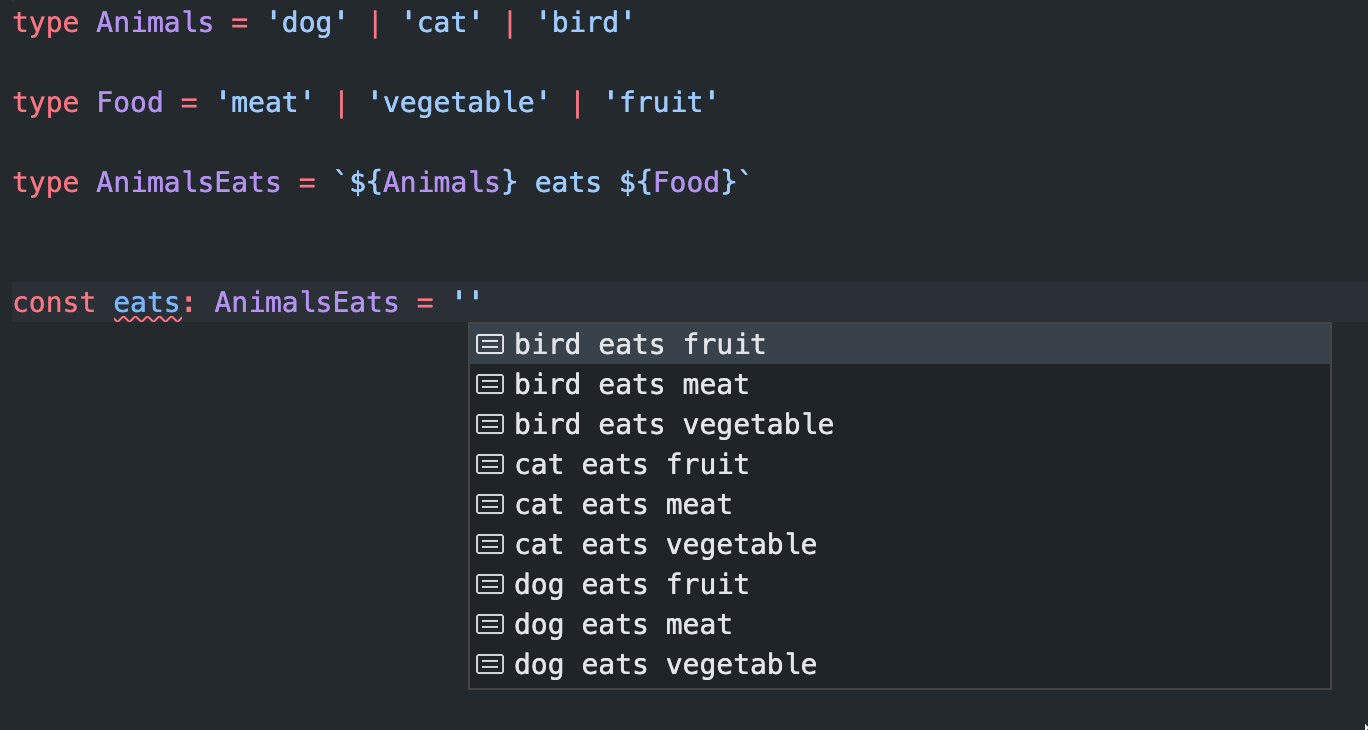TypeScript
动态属性
对象动态属性
即某个对象的属性类型 依赖于 另外一个属性,当Message的type为offer时,payload的属性为RTCSessionDescriptionInit,而不是一个联合类型PeerInfo | RTCSessionDescriptionInit | RTCIceCandidateInit。
interface PeerInfo {
id: string
nick: string
}
interface PayloadMap {
join: PeerInfo
offer: RTCSessionDescriptionInit
answer: RTCSessionDescriptionInit
icecandidate: RTCIceCandidateInit
// leave只有单接受情况,客户端不会主动发送。
leave: PeerInfo
}
type Message = {
[K in keyof PayloadMap]: {
type: K
nick: string
receiverId?: string | null
// playload的类型取决于type的值
payload: PayloadMap[K]
}
}[keyof PayloadMap]
单拎出来这一段,其实是map出了多个类型,一个key对应一个类型。然后Message通过keyof PayloadMap来获取到一个联合类型。
const MessageTypeMap = {
[K in keyof PayloadMap]: {
type: K
nick: string
id: string
receiverId?: string | null
// playload的类型取决于type的值
payload: PayloadMap[K]
}
}
函数动态属性
函数的某个参数类型取决于另外一个参数的类型,与对象不同,函数通过泛型来定义。
interface Foo {
}
interface Bar {
}
interface eventMap {
'foo': Foo,
'bar': Bar
}
type CallbackMap = {
[K in keyof eventMap]: (event: eventMap[K]) => void
}
/*
CallbackMap等同于
{
foo: (event: Foo) => void;
bar: (event: Bar) => void;
}
*/
function add<T extends keyof eventMap>(
eventName: T,
cb: CallbackMap[T]
) {
if(eventName === 'foo') {
// cb() 接受的第一个参数一定是Foo类型
} else if(eventName === 'bar') {
// cb() 接受的第一个参数一定是Bar类型
}
}
add('foo', (event) => {
// event现在是Foo类型
})
add('bar', (event) => {
// event现在是Bar类型
})
其中T作为泛型,并声明T一定有keyof eventMap当中的属性,当然也可以有其他属性。
Extends除了继承,到底能干些什么?如何用?
:在Interface和class中为继承,在其它类型定义中为T is assignable U,即T是否可以赋给U。
模板字面量类型:Template Literal Types
type Animals = 'dog' | 'cat' | 'bird'
type Food = 'meat' | 'vegetable' | 'fruit'
type AnimalsEats = `${Animals} eats ${Food}`
结果,类型约束为两个类型的组合。

增强原型: Extends prototype
需要通过interface来声明新的属性或方法,直接添加会报错。
interface可以重复声明,会被合并(Merging)。在
TypeScript中叫做declaration merging。
interface Array<T> {
mapAsync<U>(callbackfn: (value: any, index: number, array: any[]) => Promise<U>, thisArg?: any): Promise<U[]>
}
// 如果不重新声明Array的interface,则会报错,因为Array的interface中没有mapAsync方法。
Array.prototype.mapAsync = function <U>(callbackfn: (value: any, index: number, array: any[]) => Promise<U>, thisArg?: any): Promise<U[]> {
const promises = this.map(callbackfn.bind(thisArg || this))
return Promise.all(promises)
}
extends在类型定义中的行为
T extends U表示:T is assignable to U(T可以赋给U),则为真。
当T为联合类型,则会判断每一个的结果,返回联合的结果。
实现Exclude
将T中的U去除掉
// T如果是一个union类型,最终结果是遍历的集合
// U extends T 表示 U只能从T里面取
type MyExclude<T, U extends T> = T extends U ? never : T
type result1 = MyExclude<1 | 2 | 3, 2> // 1 | 3
// 相当于以下3条的联合
type result2 = (1 extends 2 ? never : 1)
| (2 extends 2 ? never : 2) // 这条不满足,取never,然后被删除
| (3 extends 2 ? never : 3)
实现IsIncluded
判断联合类型T里面是否有类型U,第一个版本如下:
type IsIncluded<T, U> = U extends T ? true : false
这里有趣的现象发生了,结果可能会出现三种不同的值:
truefalseboolean
type A = IsIncluded<1 | 2 | 3, 2> // true
// 实际上是 true | true
type B = IsIncluded<1 | 2 | 3, 2 | 3> // true
type C = IsIncluded<1 | 2 | 3, 5> // false
// 实际上是 false | false | false
type D = IsIncluded<1 | 2 | 3, 5 | 6 | 7> // false
// 这条并不会返回false,并不符合逻辑
type E = IsIncluded<1 | 2 | 3, 2 | 4> // boolean!
为什么会出现第三种情况boolean?
从MyExclude的实现可以看出,实际上E的类型等于:
type Origin = 1 | 2 | 3
type E = (2 extends Origin ? true : false) // true
| (4 extends Origin ? true : false) // false
而true | false类型就会被推导为boolean类型。
修改方法很简单,只需要判断后面的结果中是否存在false,如果满足则最终结果为false。
因为boolean一定同时包含true和false,所以也可以直接判断是否为boolean。
// 法1
type IsIncluded<T, U> = false extends (U extends T ? true : false) ? false : true
// 法2
type IsIncluded<T, U> = boolean extends (U extends T ? true : false) ? false : true
// 法3不行,因为:true 也是 assignable to boolean
type IsIncluded<T, U> =(U extends T ? true : false) extends boolean ? false : true
手动实现call,并添加类型约束
- 通过泛型
T将context约束到「原函数」的this类型上。 - 通过泛型
A将args约束到「原函数」的「参数」上。 - 通过泛型
R将「函数返回值」约束到「原函数」的「返回类型」上。
Function.prototype.myCall = function
<T /* context */,
A /* args */ extends any[],
R>
(this: (this: /* 得到T的类型为this */ T, ...args: A) => R,
context: T /* 再将context约束到T */,
...args: A): R {
// @ts-ignore
context[fnKey] = this
// @ts-ignore
const result = context[fnKey](...args)
// @ts-ignore
delete context[fnKey]
return result
}
如果没有步骤1来约束context,那么以下代码将不会报错:
// 在上面第一个参数中,不取原函数的this类型T
(this: (/* this: T */ ...args: A) => R, ...)
function getName(this: { name: string }, prefix: string) {
return prefix + this.name
}
// { age: 18 } 正确结果应该是会报错,不存在name: string属性
getName.myCall({ age: 18 }, "name:")